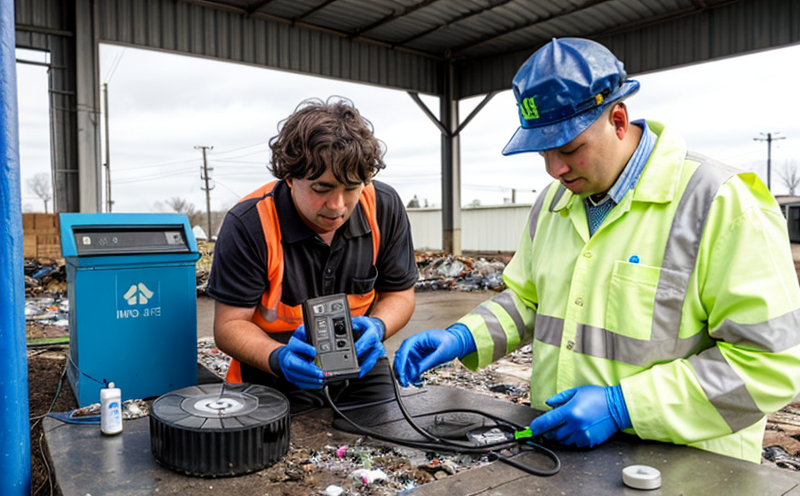ISO 23875 Safety Requirements for Battery-Powered Equipment Recycling
The ISO 23875 standard defines the safety requirements that must be met when recycling battery-powered equipment. This comprehensive set of guidelines ensures that recycled batteries and electronic devices are processed in a manner that minimizes environmental impact while safeguarding public health and safety.
Recycling battery-powered equipment presents unique challenges due to the presence of hazardous materials such as lead, mercury, cadmium, and lithium. ISO 23875 provides stringent measures to prevent contamination during processing and ensure the safe disposal of waste streams. Compliance with this standard is crucial for businesses involved in electronic waste management and battery recycling.
The standard covers various aspects of the recycling process, including:
- Material sorting
- Battery disassembly and separation
- Safe handling of hazardous materials
- Environmental impact assessment
The testing procedures outlined in ISO 23875 are designed to ensure that recycled products meet the same safety standards as new equipment. This includes:
- Battery integrity tests
- Hazardous material content analysis
- Electrical performance checks
- Emission and discharge testing
By adhering to these stringent requirements, companies can demonstrate their commitment to sustainability and regulatory compliance. This not only enhances their reputation but also ensures that they are meeting the demands of increasingly environmentally conscious consumers.
| Test Parameter | Methodology | Expected Outcome |
|---|---|---|
| Battery Integrity Test | Visual inspection and electrical resistance measurement | Detecting cracked or leaking batteries |
| Hazardous Material Content Analysis | Inductively coupled plasma mass spectrometry (ICP-MS) | Measuring concentrations of hazardous materials in ppm |
| Test Parameter | Methodology | Expected Outcome |
|---|---|---|
| Battery Discharge Test | Constant current discharge measurement | Determining the remaining battery capacity in Wh |
| Emission Testing | Closed-loop gas chromatography/mass spectrometry (GC/MS) | Identifying and quantifying volatile organic compounds (VOCs) released during processing |
The implementation of ISO 23875 not only protects the environment but also ensures that recycled products are safe for reuse. This standard is particularly important given the growing demand for sustainable practices in the electronics industry.
For businesses involved in electronic waste management and battery recycling, compliance with ISO 23875 can provide a competitive edge by:
- Enhancing brand reputation
- Maintaining regulatory compliance
- Promoting sustainable practices
In summary, the ISO 23875 standard is an essential tool for ensuring that battery-powered equipment recycling is conducted safely and sustainably. By adhering to its stringent requirements, businesses can contribute to a cleaner environment while maintaining their commitment to quality.
Benefits
The adoption of ISO 23875 Safety Requirements for Battery-Powered Equipment Recycling brings numerous benefits to organizations involved in electronic waste management and battery recycling. These include:
- Enhanced Brand Reputation: Compliance with international standards enhances the reputation of businesses, attracting environmentally conscious consumers.
- Regulatory Compliance: Adhering to ISO 23875 ensures that organizations are meeting global regulatory requirements for electronic waste management and battery recycling.
- Sustainable Practices: The standard promotes sustainable practices, contributing to a cleaner environment and reduced carbon footprint.
- Cost Savings: By minimizing contamination and ensuring efficient processing, businesses can reduce operational costs.
- Risk Management: Compliance with ISO 23875 helps mitigate risks associated with improper recycling practices.
In addition to these benefits, organizations that comply with ISO 23875 are also contributing to a safer and more sustainable future. By ensuring that recycled products meet the same safety standards as new equipment, they are helping to protect public health and the environment.
Industry Applications
The ISO 23875 standard is widely applicable across various industries that deal with electronic waste management and battery recycling. Some of these applications include:
| Industry | Description |
|---|---|
| Consumer Electronics | Recycling of smartphones, tablets, and other consumer devices. |
| Automotive Industry | Disposal and recycling of batteries from electric vehicles. |
| Data Centers | Management of electronic waste generated by data center operations. |
In each of these industries, the standard ensures that recycled products are safe for reuse or further processing. This helps to minimize environmental impact and reduces the need for raw material extraction.
| Industry | Description |
|---|---|
| Retail | Management of electronic waste from retail operations. |
| Telecommunications | Recycling and disposal of batteries used in telecommunications equipment. |
The implementation of ISO 23875 in these industries ensures that recycled products are safe, sustainable, and compliant with global standards. This not only enhances the reputation of businesses but also contributes to a cleaner environment.
Eurolab Advantages
Eurolab offers comprehensive testing services for ISO 23875 Safety Requirements for Battery-Powered Equipment Recycling, providing businesses with the expertise and facilities needed to ensure compliance. Our advantages include:
- Expertise: Eurolab's team of experienced professionals ensures that all tests are conducted in accordance with international standards.
- Facilities: We offer state-of-the-art facilities equipped with the latest testing equipment to ensure accurate and reliable results.
- Comprehensive Services: Eurolab provides a wide range of services, including material sorting, battery disassembly, and hazardous waste management.
- Global Recognition: Our certifications are recognized worldwide, ensuring that businesses can meet international standards for electronic waste management and battery recycling.
By partnering with Eurolab, organizations can ensure that they are meeting the highest standards for safety and sustainability in their electronic waste management and battery recycling processes.





